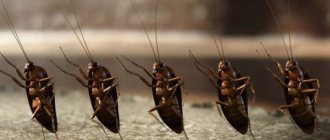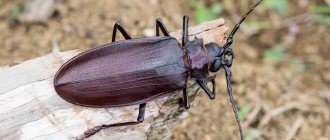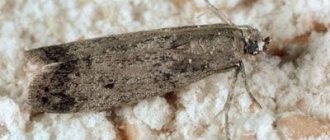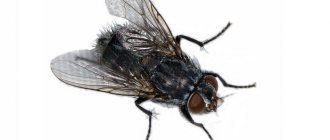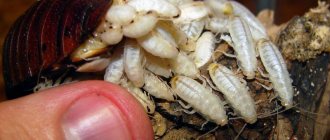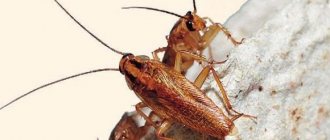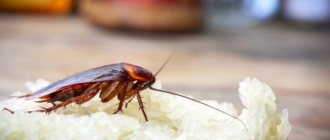A little more about the reasons for the appearance of cockroaches in the house
If everything is more or less clear about where cockroaches come from in an apartment, then the reasons for their successful “fixation” and reproduction indoors are not so obvious to most of us.
Cockroaches are insects that require a certain area to spread their population. If there are already too many cockroaches in an infested apartment and there is not enough food for everyone, some of them are sent to neighboring rooms in order to develop new territory. This is the reason that after a while the entire entrance or house suffers from cockroaches.
Sometimes cockroaches colonize a room from a female or a pair of cockroaches that was accidentally introduced earlier. Most often, this problem occurs among people who travel a lot or go on business trips, staying at various hotels and inns. Sometimes cockroaches get into the house with food bought at the supermarket.
An example of an apartment infested with cockroaches
Why do they stay
Most often, there are three probable reasons why the cockroach population takes root in a certain apartment. Availability of available food, free access to water and suitable conditions for reproduction. The furniture type loves homes where there are a lot of books and furniture, the aggressive American one appears idiopathically (inexplicably, for no apparent reason) and is just as inexplicably able to disappear.
Warm and humid habitats are not favored by all cockroach species: oriental cockroaches, for example, live in cold sewer pipes.
Insects are able to meet owners who have returned after a month's absence and left the apartment in sterile cleanliness, if the sewerage system is not blocked, and they can find water in the sewer pipes.
Intense infestation occurs in apartments where optimal living conditions are created for cockroaches - food, water, heat and humidity. But often an invasion occurs not in the form of scouts, who brought with them a small population that began to multiply intensively, but in the form of an avalanche that surged, escaping from a sprayed insecticide or a European-quality renovation that had begun nearby, with walls upholstered to the ground.
The omnivorous nature of insects and their unpretentiousness are quite capable of leading to their appearance in an apartment where there is no visible access to food, but there is humidity and warmth.
It has been noted that some individuals easily move from apartment to apartment in the summer, using open windows for this, so that they can feed in another place.
Cockroaches in the house are a sign of unsanitary conditions
Regardless of the reason for the appearance of cockroaches, maintaining and increasing their population is possible only if there are a number of favorable factors:
If cockroaches appear at home, you need to carefully study the possible ways of their entry. It is imperative to seal all the cracks in the walls and floor, and equip the ventilation openings with special meshes that will not allow other insects to enter the apartment.
It often remains unclear where the cockroaches came from, because there can be many options. However, these insects can continue to live and reproduce only in conditions favorable to them.
Typically, a cockroach infestation begins with a few individuals, which become the founders of an entire population that emerges in just a few weeks. Unsanitary conditions in an apartment are the main factor in the comfortable life of cockroaches.
By the way, after disinfestation, cockroaches can return only if the owners do not care too much about the cleanliness of their home.
See also our experiments on cockroaches:
We catch cockroaches and test various means on them - see the results...
What to do if there are cockroaches in the house
It is important for every person living in an apartment building or private building to know where cockroaches come from. This will remind you of the need for preventive measures: maintaining order, eliminating cracks in the walls and closing ventilation ducts.
But if cockroaches have already appeared in the house, you need to urgently start fighting them:
- Clean up the apartment. The appearance of cockroaches may even be a reason for minor repairs, but if this is not possible, then general cleaning is mandatory. Eliminating deposits of old garbage and eliminating openly lying food products will make the fight much more successful and will speed up the results.
- Use special means and traps. The industry offers many chemicals to kill cockroaches: insecticidal crayons, aerosols, powders and gels. In addition, you can use folk recipes or put
Cockroaches appeared back in the Carboniferous period, about 300 million years ago, so the thermal power plant also burns a certain amount of cockroach remains “processed” in the bowels of the Earth in the form of coal. They flourished for a long time, being the first to master a special ecological niche, the upper loose litter of Paleozoic forests. Subsequently, some of them switched to predation: the modern descendants of this group became praying mantises.
“Swimming” in the forest floor determines the main features of the cockroach’s appearance: powerful legs, a dense, flattened body, a head with mouth parts turned back. They have retained these general structural features to this day. For a long time, cockroaches remained the dominant group of insects and faded into the background only in the second half of the Mesozoic, replaced by more “progressive” beetles.
Entomologists have not yet established how many species of cockroaches live on the planet: estimates range from five to ten thousand. However, only 20-30 of them became truly synanthropic, constantly living and reproducing side by side with humans. Unlike fleas or ticks, they do not act as “specialized” carriers of diseases, although they are capable of spreading infections on their paws and body.
The usual inhabitants of houses in central Russia are the red Blattella germanica and the black Blatta orientalis. Others can be found less frequently: according to some reports, breeding centers of large Periplaneta americana, a cosmopolitan species that has spread almost throughout the world, have recently appeared in Moscow and St. Petersburg.
Leonid Anisyutkin, senior researcher at the laboratory of insect taxonomy at the Zoological Institute of the Russian Academy of Sciences: “It would be interesting to find out what exactly makes certain cockroaches synanthropic. Why, out of thousands of species, only a few connected their way of life with man and his home? There is no answer to this question yet. It can be assumed that this requires some suitable physiological characteristics, for example, resistance to low humidity and the ability to eat “homemade” food.”
Red cockroaches appeared here relatively recently, in the middle of the 18th century. It is generally accepted that they arrived with the convoys of the Russian army that participated in the Seven Years' War, which is why they received the nickname “Prussians”. However, in Prussia they were called “Russians”, and in France - “Swabians”.
But black cockroaches are our original neighbors, living in Russia since time immemorial. They are more heat- and moisture-loving, so they feel better in village houses and basements, but they have a hard time withstanding cold winters and do not survive in the nature of central Russia. Perhaps they were once brought to us by settlers from the tropics, although this story is already very ancient and dark.
The preference for a rural lifestyle and competition with the Prussians is costly for black cockroaches. Over the years of urbanization and concrete construction, their numbers have dropped so much that there are even proposals to include them in the Red Book. Lately there have been noticeably fewer Prussians; the reason for this depopulation remains unknown. Most likely, it is associated with a general improvement in the sanitary situation and the emergence of new generations of insecticides.
For example, the contact pesticide fipronil, which is included in many popular insect repellents, has a delayed effect. The treated cockroach does not die on the spot, but manages to transmit the poison to its neighbors. By eating each other's excrement, they exchange nutrients and microflora, and with them a toxin that reliably blocks the passage of a signal in their nervous system.
Some cockroaches are almost as social as their close relatives, termites. They live in small groups of several adults, plus growing larvae. Perhaps this allows them to exchange microflora necessary for digesting wood and other complex organic matter. “Domestic” cockroaches also gravitate towards sociality: alone they grow and reproduce more slowly.
The life cycle of red cockroaches takes about a year, black ones live longer - under unfavorable conditions, their development can stretch up to three years. At the same time, neither one nor the other is particularly fertile. Each female manages to make only a few clutches of about 20 eggs each.
Reasons for the disappearance of urban cockroaches, unlikely and incredible:
weakening of the Earth's ozone layer; high-frequency radio signals from cellular communications and WiFi; distribution of GM products and food additives; use of modern paints, adhesives and repair materials; wars between cockroach populations.
Humanity has been living side by side with these annoying insects for centuries. All this time, by any means, the owners of the homes tried to get rid of the uninvited guests. In the modern world, pesticides are used for this, but how did they fight cockroaches in Rus'?
Cockroaches escaped from mobile phones?
There are many alternative versions of the reasons for the exodus of cockroaches from apartments, which contradict the official arguments. In particular, cell phones, microwave ovens and other modern household appliances that emit a variety of waves are called the culprit in the care of insects. But there are no serious scientific studies on this topic, and therefore they talk about it carefully. And indeed, cockroaches have experienced so much over their centuries-old history that they would hardly be afraid of a cell phone. As a last resort, they would quickly adapt to the proximity of technology.
In a similar way, it is easy to question the version about the disappearance of cockroaches due to the appearance of genetically modified foods and all kinds of artificial food additives, which today are found in almost all food - from bread to sausage. Yes, the composition of food has changed especially over the past 20 years, when the reduction in the number of cockroaches became noticeable, but are insects surviving in the most unfavorable conditions really afraid of GMOs? Let me remind you that cockroaches are capable of withstanding radioactive radiation 15 times higher than lethal levels for humans. And it turns out they can’t stand the new sausage? Hardly.
By the way
Dozens of companies offer to exterminate cockroaches in Moscow apartments - they have various methods and, of course, prices. On average, they charge 2-3 thousand rubles for getting rid of insects for an ordinary two-room apartment. Typically they also provide a 12 month warranty. And if you agree on joint baiting of cockroaches with your neighbors, you can count on a decent discount. And the efficiency in such cases increases.
Where did the “Prussians” come from in Russia?
There is no mention of domestic pests in medieval Russian chronicles. Historians date the first negative statements about them to the middle of the 18th century and are associated with the Seven Years' War in Europe, in which Russian troops also participated. Then, in 1757, Austria, France, Russia and Saxony united against Prussia and England. Russian soldiers fought in the Prussian lands with varying success and, at the end of the war, went home. And once they were in their homeland, they were surprised to discover that their carts, duffel bags, as well as the collars and pockets of their uniforms were simply swarming with some kind of red insects. The soldiers did not think that they were attracted there by the remains of meat and bread crumbs. “Prussians,” as the Russians called them, very soon multiplied throughout all villages and cities and they could be seen not only in peasant huts and inns, but also in the mansions of noble landowners. Previously unknown insects that do not bite humans and fear them like fire were initially perceived as harbingers of profit. They were even used as a medicine - they were added to vodka, in the belief that it would then become useful for colds. The peasants came up with a sign associated with them - if the “Prussians” run away from the house en masse, it means a fire will happen soon. Whether this is true or not is unknown. But very soon it became clear that the same food that people eat is also needed by new insects, and the Russians began to seriously think about how to now rid their homes, taverns and inns of these small parasites.
Deadly European renovation, cockroach wars and GMOs
Residents of the CIS - and more specifically, journalists from non-core publications - put forward their own versions of the disappearance of red cockroaches. True, it is speculative, even without journalistic research, let alone scientific research. Let's assume that the media is right and there really are fewer cockroaches. How realistic are the supposed causes of what happened?
According to one version, red cockroaches were destroyed by European-quality renovation, and specifically by the “chemistry” contained in eurolining, finishing panels, bathroom tiles, suspended ceilings, and so on. Residents believe that the insects left the apartments, unable to withstand the presence of terrible chemicals. But where is the logic here? Insects, much more resistant to poisons and radiation than people, fled, but people stayed and feel very good in houses with an updated design. Most likely, in reality, the fact is that during the repair the plumbing is also repaired, the taps stop leaking, the humidity in the room drops, and the cockroaches become less comfortable.
Another, no less fantastic version is a decrease in the quality of food, genetic modification of vegetables and farm animals, and the like. The same question arises here: why do people eat supposedly bad food and not die, but cockroaches, who are born to eat garbage, turn out to be so sensitive? In addition, it would not be amiss to at least remember that products with genetically modified components are not sold on the territory of the Russian Federation, not to mention the fact that GMOs do not pose any health hazard to anyone. So, it seems that a number of Homo sapiens exaggerate the danger of their own food and, rather, want the unhealthy popularity of their articles, based on intimidation of insufficiently educated segments of the population.
Finally, there is a version that some populations of red cockroaches fight with others and due to these wars, all insects of this species suffer great losses. This doesn't seem true. In a real competition between cockroach populations, one “tribe” would win, whose members could be distinguished from others by the composition of their DNA. However, analyzes show that, at least in France, representatives of the species Blattella germanica, living in cities 900 kilometers apart, are genetically very close. This means that fierce competition and rapid evolution of red cockroaches are not observed now. The lack of genetic diversity suggests that cockroaches are now experiencing a period of stability and there are no unfavorable factors that would actively adjust their adaptation to new environmental conditions.
There are also very strange assumptions - for example, that the destruction of the Earth's ozone layer kills Blattella germanica. Adherents of this theory are not embarrassed by the fact that cockroaches, over hundreds of millions of years of evolution, when the composition of the atmosphere fluctuated very, very strongly, have practically not changed and have always felt normal, and also by the fact that the largest ozone holes are now not growing, but decreasing.
The most likely scenario is this. Since the 1990s, the quality of life in Russia and the CIS countries has nevertheless increased. People renovated their premises and moved to new houses. There were fewer places with unfavorable sanitary conditions. As a result, the number of red cockroaches has actually decreased. But it is impossible to say that cockroaches have completely disappeared: it is enough to go to the dormitory of a university (it does not necessarily have to be a low-rated regional academy!) or to its cafeteria to see old acquaintances.
What kind of cockroach is this?
In Russia, all insects similar in behavior to “Prussians” began to be called cockroaches. Rumor has it that the name was invented by the Russian Tatars, whose language is part of the Turkic group - they had the word “Tarkhan” in their vocabulary, meaning a clan that, based on its clan, was exempt from all taxes and generally “owed nothing to anyone.” After all, in Russia, cockroaches, unlike other insects, are not integrated into the food chain: not a single animal or bird eats them. But it turned out to be necessary to exterminate cockroaches: the majority of the country’s population never had food abundance, and then there are these parasites. But then the Russians did not know that, unlike people, cockroaches can live without food for about 40 days and can survive without air for 45 minutes, so even drowning them in water will not work. And in another year, one female cockroach is capable of laying more than 2 million eggs, and where until recently these insects were rare, soon hordes of cockroaches were running around.
Where do different types of cockroaches appear in an apartment?
The most frequent guests in people’s homes and their neighbors are only a few species:
- black beetle;
- Prusak;
- sewer
One of my favorite places is old wallpaper.
Each of them has their own preferences in the place of residence, but they have common wishes. Living place:
- Garbage cans and around them.
- Under the sink, especially when water is leaking.
- In electrical appliances.
- On shelves where the human hand rarely passes.
- Under baseboards and coating detachments.
- In the bathrooms.
How to kill cockroaches
But people very quickly realized that for a normal life, cockroaches need a warm and humid room, and at low temperatures they die. And this is true: entomologists say that at +15 cockroaches stop reproducing and become numb, at -5 they die in half an hour, and at -7 - in a minute. And the Russians came up with a way to get rid of cockroaches. This was usually done in harsh winter; in the hut they stopped lighting the stove, opened the windows and doors wide and went to their neighbors for a day. The cockroaches could not run from a cooling hut to another in the cold; following the warm air, they crawled to the ceiling and, having frozen to death, soon crumbled to the floor. The family, returning home, only had to sweep away this whole bunch of cockroaches and throw it out of the countryside.
But the “Prussians” annoyed people even in the summer. Having noticed the feeding habits of insects, various traps were set for them. They left old dishes with the remains of beer or honey on the tables, and then, when they were filled with eternally hungry cockroaches, they covered them with a lid and threw them away. Another, more effective way was to prepare decoctions. Fresh leaves of tansy, wormwood, mint, wild rosemary, honeysuckle, anise and sprigs of red elderberry were boiled, the prepared solution was poured into cups and placed around the hut. They also laid out the plants themselves in all corners of the room. Cockroaches hate the smell of these herbs, but they still drink the solutions prepared for them and die from poisoning. The remaining individuals, as a rule, scatter and emigrate to their neighbors. And later they move back to the same hut where they lived, when the grass there completely withers and the owners get tired of preparing decoctions.
Therefore, it is only now possible to completely get rid of cockroaches, with the advent of modern chemicals. And even then, unfortunately, this matter is complicated.
Cockroach
- one of the oldest species on earth, the first finds were noted in the Carboniferous period 280-300 million years ago. Have not changed in the process of evolution. One of the groups of insects widespread throughout the globe. There are more than 55 species in the CIS countries. 8 types are of practical importance. In total, science has described 3,600 species. The insects are thermophilic and inhabit mainly heated buildings. They actively reproduce all year round and are well oriented in space. They mark their shelters and the path to them with trace pheromones. Almost omnivorous (they eat everything except glass and metal). They eat both fresh and spoiled foods. They can eat non-traditional foods: pepper, ink, leather, etc.
The cockroach is a carrier of more than 40 types of various pathogens (causing intestinal infections, urinary tract infections, tuberculosis, hepatitis, etc.), as well as worm eggs. In addition, cockroaches can provoke attacks of allergies and asthma in both children and adults. But asthma is not caused by the insect itself. When a cockroach dies, what remains is a skeleton, which contains chitin. A mixture of chitin and house dust causes asthma. And the most dangerous thing is when cockroaches appear in a room where there are small children - there have been cases when hungry insects have bitten the edges of the ears, nose, and lips of babies!
Cockroaches are one of the most difficult insects to eradicate on the planet. People have been fighting them for many centuries, in a variety of ways and means, but victory is still far away. Although you can create a small paradise without insects in a separate apartment or even an entrance hall, if you approach this matter with the proper amount of professionalism. But this is precisely the problem - we are observing a strange paradox: people spend millions of rubles on buying an apartment, thousands on its renovation, hundreds on monthly utility bills, but they regret spending an extra ruble on their health and comfort in their home. But cockroaches are carriers of serious diseases, not to mention the moral discomfort from their presence on your territory.
The cockroach appeared on planet Earth when there were no humans, no present-day birds and animals, no flowering plants.
Cockroaches crawled through the damp, warm forests that formed the coal seams. By the end of the period, species appear that can be attributed to the currently existing family Blattidae
. It is characteristic that until the Tertiary period among the cockroaches there were absolutely no forms that were wingless or with shortened wings. The resemblance to modern cockroaches is striking. The design turned out to be successful, and nature has been churning it out for 350 million years.
In total, more than four thousand species of cockroaches now live on earth. Most of them are free creatures and do not bother humans; they swarm around in the bark of rotting trees and in fallen leaves, just as during the formation of coal. Some of the cockroaches are very large - half the size of a pencil.
The red cockroach or black cockroach Blattella germanica
and the black cockroach
Blatta orientalis
.
Also common in Eastern Europe is the American cockroach Periplaneta americana
.
Where and when did the Prussian come to us?
Here the opinions of experts differ. Some say that its homeland is South Asia, and that it was brought to Europe in the 18th century. Others believe that he moved from Africa on ships following the people. But the true homeland of the Prussian is the Crimea, where he lives outside human buildings and dwellings. Some scientists also believe that red cockroaches, like black cockroaches, are species similar to archaeophytes. They moved north, settling under a man’s roof. Before the revolution, they write, there were cockroaches in every Russian hut. In central European cities, the black cockroach, or as people call it, the kitchen cockroach, has been known for more than 400 years.
Cockroaches are extremely unpretentious. But the main thing for these migrants from the southern geographical zones is warmth, the presence of nearby moisture and, of course, food. Crumbs on the kitchen table and even just a poorly wiped surface are a self-assembled tablecloth for them. The glue on the postal envelope (stamp) is enough to feed a cockroach for a week. He can also eat soap, shoe polish, book spines, and paper itself. But, of course, he also has gastronomic preferences - white bread and especially beer (a drink and a snack at the same time!). That is why cockroaches most readily choose kitchens, bakeries and breweries to live.
In every country on Earth, people know what cockroaches are. These mobile insects penetrate houses, they can be seen in landfills, in basements - in general, where it is warm and there is something to profit from. And cockroaches can profit from almost anything; they like any organic matter. It was this powerful immunity that allowed cockroaches to exist from century to century without any consequences for their species.
General information about cockroaches
By the way, there are about 4 thousand species of cockroaches all over the world! Although one can envy the immunity and survival rate of cockroaches, one cannot help but condemn them for the fact that they carry a lot of different infectious diseases. Therefore, it is strictly forbidden to have contact with them; moreover, food that a cockroach has run through becomes unfit for food and must be thrown away immediately, after which you can start poisoning the cockroaches at home and drive them out of your home forever. As a rule, disinsection should be carried out at least twice, with some break between treatments, in order to prevent insects from returning again after a while.
Possible hiding places
Disinsection is still one of the most effective ways to combat hated insects, but in order for it to be successful, it will have to be used more than once. In this case, it is necessary to carefully monitor possible reasons and places of penetration. The question of where cockroaches hide is fraught with many possible answers, especially considering that they are capable of hiding in communications and even damaging cables.
Cockroaches become frequent guests in homes where many people live (for example, in a dormitory, or in a rented living space), because accidental splashes of grease in the kitchen or a trash can that is not collected on time are enough for them.
In an apartment they can hide anywhere, from household equipment to books and souvenirs, radiators and any secluded corners.
Occurrence of cockroaches
In general, the cockroach appeared a very, very long time ago, when there were no birds, no animals, no people on Earth. Cockroaches crawled quietly through forests with high humidity and warm climatic conditions. During this period, the formation of coal strata of the earth was observed, and by the time it was completed, the cockroach had developed into a species that is already known in our time - the family Blattidae. Also, the most common types today include:
- Blatella germanica
- Blatta orientalis
- Periplaneta americana
For the most part, these are species that people can encounter in their homes.
Modern cockroaches
Today, cockroaches are still actively developing, but fortunately for us, most of them prefer to settle apart from humans, swarming in fallen leaves and rotten trees. The good thing is that the cockroaches known to us, which can periodically appear in our homes, are small in size, since there are certain species where an adult can reach the length of half a pencil. In any case, it is better to stay away from cockroaches and not attract them into your home by promoting unsanitary conditions.

